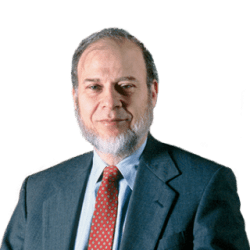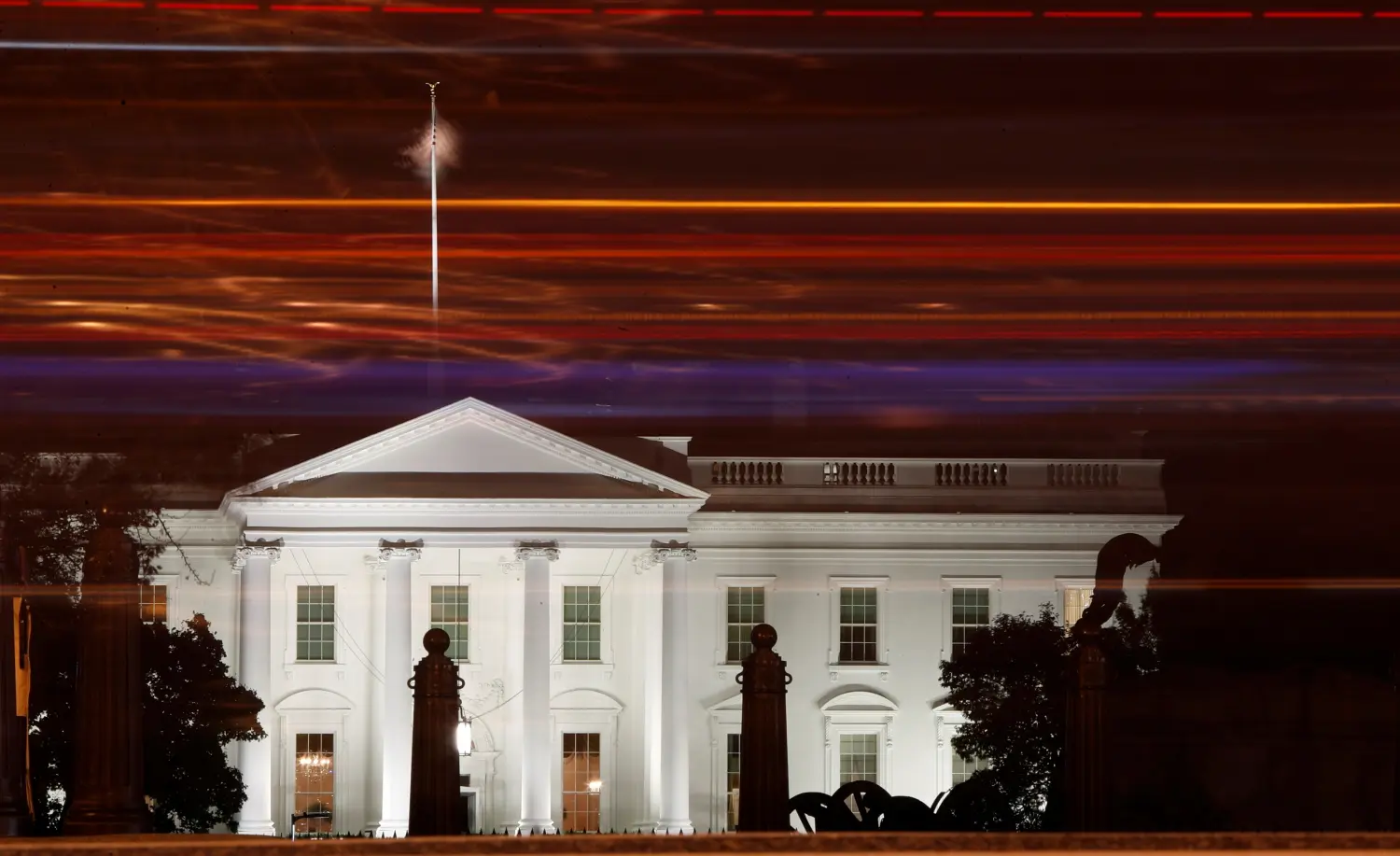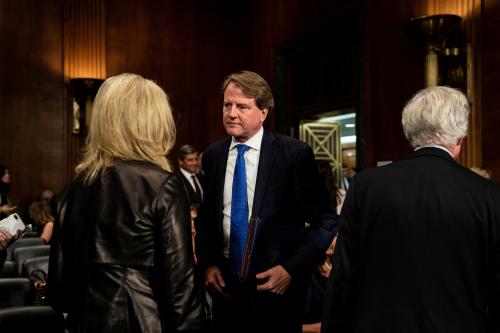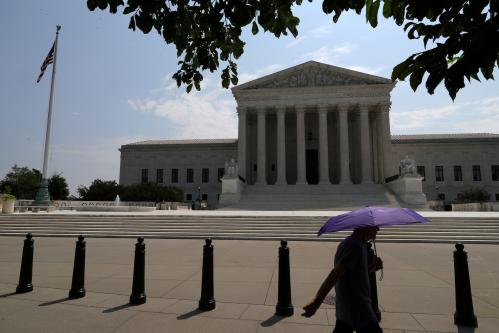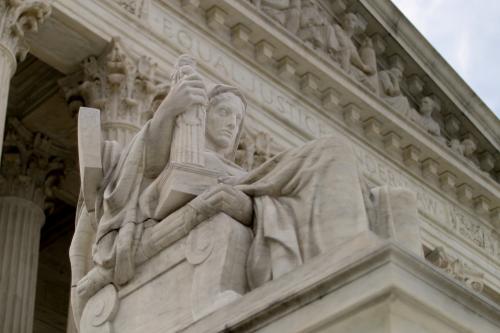President Trump has limited the information the House has had available for its impeachment and other investigations, by repeatedly instructing both current and past members of his administration to refuse to recognize the authority of congressional subpoenas. The president’s claim is that executive privilege immunizes his close aides from an obligation to testify before or to turn over to Congress documents in their possession. Trump’s exercise of this claim to withhold evidence from Congress forms the basis for the House’s second article of impeachment. If President Trump is correct and his aides and their records are immune from subpoena, then he will have acted within his sphere of executive authority, and Impeachment Article II, for obstruction of Congress, is likely to fail. However, as applied to anyone other than the president himself, this is an extreme and questionable interpretation of the protections executive privilege affords, as evidenced by Judge Ketanji Brown Jackson’s decision in November. In it she rejected former White House counsel Don McGahn’s claim that executive privilege immunized him from having to appear before the House Judiciary Committee in response to its subpoena.
Claiming immunity for top aides is not, however, unique to this president—although he has pushed the envelope beyond what his predecessors have argued. Since Nixon, both Democratic and Republican presidents have made executive staff immunity claims. Seldom, however, have these disputes played out to the end; it appears that neither the executive nor the legislative branch wants to cede power to the third branch, the judicial, to decide. Instead, immunity claims usually result in negotiations between Congress and the executive, ending either with the surrender of one side (often after the situation triggering the standoff is no longer politically fraught), or with a negotiated compromise in which the committee issuing the subpoena typically gets some but not all of the information the executive originally tried to withhold.
There is little law that is directly on point. Before the McGahn case, only one of the few cases that passed on the legality of broadly claimed executive privilege involved an individual’s refusal to appear before a Congressional committee. In this case, a House committee sought testimony from Harriet Miers, President Bush’s White House counsel, regarding the replacement of seven U.S. attorneys, allegedly let go for unsavory political reasons. D.C. District Court Judge John Bates rejected Miers’ claim of immunity, holding that she was required to appear and give testimony, although Bates did note that executive privilege might support refusals to respond to particular questions. Judge Jackson largely endorsed the reasoning of Judge Bates in justifying her decision. The Miers case did not, however, settle the law, even for the District of Columbia (the district in which her case was heard). Although Judge Bates’ opinion is detailed and thoughtful, it was never reviewed on the merits by a higher court because the appellate process was unlikely to be finished before the expiration of the 110th Congress, at which point the committee’s subpoena would lapse. Other than Miers and McGahn the few other cases dealing with executive branch claims to immunity all deal with subpoenaed documents.[1]
As Judge Jackson noted in her opinion, legal arguments for allowing a president’s aides to claim immunity from Congressional subpoenas are mainly found in Department of Justice (DOJ) memoranda, usually prepared by the Office of Legal Counsel (OLC), and mainly citing arguments in earlier OLC memoranda as justification. These DOJ opinions are not case law and read more like partisan briefs than dispassionate legal analyses.
In other words, even close presidential aides do not step into the president’s shoes when claiming legal process immunity.
The fount of later DOJ opinions is one rendered in 1971 by William Rehnquist, then head of OLC and later Chief Justice of the Supreme Court. Rehnquist advanced two main justifications for his opinion supporting immunity, neither of which holds up well to scrutiny. The first is that the president’s top aides are on call 24/7 and that if they were busy testifying before Congress they might be unavailable when the president needed them. This claim made little sense when first advanced and makes even less sense today when electronics allows virtual meetings at a moment’s notice. The second argument, more favored in later justifications, was that a small number of highest-level advisors (“elbow aides”) are the president’s alter egos and share the president’s (assumed) separation-of-powers-based immunity from Congressional subpoenas. This argument, however, appears untenable following Supreme Court decisions in the companion cases of Nixon v. Fitzgerald and Harlow v. Fitzgerald. These cases involved a civil suit by a whistleblower who claimed that Nixon and two top aides conspired to eliminate his job because he had disclosed to Congress substantial cost overruns in a military procurement program. Taken together, the cases hold that a (former) president may not be sued civilly for actions taken in his capacity as president, but aides who assisted him in any decision do not enjoy absolute immunity. In other words, even close presidential aides do not step into the president’s shoes when claiming legal process immunity. The president’s lawyers, however, seek to avoid the precedential force of Harlow by arguing that aides with different responsibilities than Harlow’s are not necessarily covered by this precedent. A fair reading of Harlow does not support this argument, but a court that wanted to find for Trump could distinguish Harlow on these grounds.
The few other cases in which presidents have sought to use executive privilege as an absolute shield against Congressional subpoenas involve documentary requests and so, unlike Miers, are not directly on point. Nevertheless, several principles appear clear. First, the scope and conditions of executive privilege are for the judicial branch to decide, notwithstanding the executive’s status as a separate branch of the government. This was a core holding in U.S. v. Nixon, and has been reiterated in later opinions. Second, separation of powers arguments are not irrelevant. Some measure of executive privilege is implied by the Constitution. Third, the president’s status appears unique, and the full scope of the immunity that a president might claim is not shared by even his closest assistants. Fourth, the protections of executive privilege as they relate to subpoenas are, apart from the Congress’s presumed inability to haul the president before it, not absolute. Rather they are subject to qualifications, which may include balancing the need for evidence against the values the privilege protects. Fifth, in deciding whether to honor a claim of executive privilege, a judge in some circumstances may review allegedly privileged material in chambers to decide if a privilege should attach.
Given these principles and earlier OLC arguments, it would appear that some of the immunity claims advanced by President Trump on behalf of his aides seek to stretch the law of executive privilege beyond its acknowledged boundaries. Indeed, in the case of some witnesses who have been instructed not to testify, the stretch is extreme. In particular, claiming immunity for staff who are not direct reports to the president, for members of the cabinet or their staff, and for people who have left the government would require the courts to go far beyond rethinking the availability of subpoena immunity for the closest active presidential aides.
A court that so desired could treat information relating to interactions with Ukrainian President Zelensky and his staff as diplomatic secrets intended for communication to the president whose details courts cannot probe.
But in a case as politically charged as the current ones and with a Supreme Court that is perhaps polarized politically and uncommonly willing to overturn precedent, today’s law may not be the rule tomorrow. Moreover, even within the bounds of what has been decided, there is, without dramatically breaking from precedent, a narrow window for upholding the president’s claims. A 1953 Supreme Court decision, U.S. v. Reynolds, gave lower courts almost no discretion to deny claims of executive privilege when there is on its face a plausible case that the privilege has been invoked to protect military secrets, and it limited substantially the trial court’s ability to review the allegedly privileged material in chambers to determine if that material in fact involved military secrets. Moreover, several more recent decisions denying executive branch personnel immunity from subpoenas suggest that a different analysis might have applied if military or foreign policy secrets were at issue. The suggestion reflects dicta in U.S. v. Nixon leaving open the possibility that presidential communications might be immune from subpoena if a need to protect military, diplomatic, or sensitive national security secrets is claimed. A court that so desired could treat information relating to interactions with Ukrainian President Zelensky and his staff as diplomatic secrets intended for communication to the president whose details courts cannot probe, and it could hold that executive branch officials are immune from subpoena if called solely to testify on matters related to “negotiations” with Ukraine.
If the trial before the Senate takes the legal issues seriously, disputes over whether President Trump was privileged to order aides not to appear and to withhold from Congress subpoenaed documents are likely to be central to the disposition of the second impeachment count. If, as many expect, Republican senators vote against conviction despite apparent facts, they may justify their votes by saying that President Trump’s assertion of immunity as an executive privilege was in accord with the law. Only a definitive Supreme Court decision, which if it comes at all will come long after the Senate trial, could prove the Senators wrong.
Whatever happens in the impeachment trial, the question of whether executive privilege allows a president’s close aides to ignore subpoenas is not going to go away.
Whatever happens in the impeachment trial, the question of whether executive privilege allows a president’s close aides to ignore subpoenas is not going to go away. McGahn, which is on appeal, arose long before the House began impeachment proceedings, and one can expect that future attempts by the House to investigate the president’s actions will also generate subpoenas to officials who will make immunity claims even if impeachment is not in issue. If current precedent holds, the courts are likely to reject immunity claims made on behalf of or by executive branch officials, but this will not mean, as Judge Jackson took pains to point out in McGahn, that these officials will have to answer all the questions committee members ask. Two widely accepted privileges may justify refusals to answer. These are the deliberative process privilege, which protects pre-decisional deliberations involving the president, cabinet secretaries, or other executive department officials, and the presidential communications privilege, which protects communications to and from the president, even if they are not part of an identifiable decision-making process.[2]
The deliberative process privilege is a common law privilege, while the presidential communications privilege is rooted in the separation of powers, making it the more protective of the two. Moreover, the “close aide” restriction that OLC opinions treat as applying to executive branch immunity claims is less likely to limit the scope of protected information when the presidential communications privilege is invoked. In the most thorough judicial treatment of this privilege, Judge Patricia Wald, writing in 1997 for a panel of the D.C. Circuit Court in In re Sealed Case, held that the presidential communications privilege protected documents produced by lower-level White House staff even if they were never communicated directly to the president, so long as they were part of a chain of information requested by top presidential staff for use in advising the president. Presumably the same principle would apply if the privilege were claimed to prevent lower level staff from testifying to information conveyed to superiors that would have been protected had it been embodied in documents. The deliberative process privilege might, however, be the only available privilege if discussions among subordinates were not in response to requests from top level presidential aides or related to polices that they had the authority to implement without higher level consultation.
The In re Sealed Case opinion states explicitly that the panel’s analysis would not necessarily apply where subpoenaed documents were sought not for law enforcement purposes, as they were in that case, but by the Congress.[3] Nevertheless, it seems safe to draw certain conclusions from Judge Patricia Wald’s careful analysis and from privilege law in general. First, presidential communications protected by the deliberative process privilege would also be protected by the presidential communications privilege, though the converse is not true. Thus, only the contours of the presidential communications privilege need be examined to determine what information executive branch officials cannot be required to disclose so long as the information was assembled at the direction of the president or a top executive office aide. Second, the privilege is a qualified privilege and not an absolute one. This means that if presumptively privileged evidence is not available from non-privileged sources, testimony or document production can be compelled if the need for the evidence is great enough. However, the need hurdle that must be overcome is a substantial one, not easily surmounted. Third, the presidential communications privilege applies only to communications relating to the president’s official duties. If, for example, a top presidential aide told President Trump while he was sitting in the Oval Office that his hotels had lost money in 2018, the communication would not be protected. Fourth, where the privilege does apply, its protective umbrella is a broad one, covering communications that originate in the work of lower-level staffers and reach the president’s ears, if they do at all, only through one or more staff intermediaries. If a president’s direct report decides not to relay to the president information sought in order to better advise him, the communication nonetheless remains protected. In effect, it is the potential utility of the communication in advising the president and not its actual use that matters in evaluating the privilege.
The limits of the presidential communications privilege are likely to have much in common with the limits on other confidential communications privileges, perhaps with a special bow to its Constitutional roots. For starters, communication privileges do not bar testimony to what a witness knows apart from the communication, except to the extent that the contents of a protected communication might be directly inferred from such testimony. Suppose, for example, that a staffer listening in on the July 25 call to Ukrainian President Zelensky noticed that even though Joe and Hunter Biden’s names were mentioned in the call, the transcript of the conversation did not mention them. If the staffer called a superior’s attention to the omission, the privilege might allow or even require the staffer to refrain from responding when asked by a House member if he had reported the omission to a superior. The assumption would be that the report was eventually intended for the president. The member could, however, ask the witness if he had noticed any discrepancies between what he had heard and the transcript of the call. The presidential communications privilege would not apply because the witness would be asked about what he personally knew and not about what he had told his superior.
Communications privileges are also typically waivable by the privilege holder. Presidents can waive their communications privilege, and most often they do. Hard problems can, however, arise when waivers are not explicit. For example, the release of part of a privileged document, or testimony to part of a privileged conversation, is frequently held to waive the privilege with respect to withheld portions of the document or conversation, even if a full waiver was not intended. Imposed waiver is particularly likely if the portrait painted by the released information would change significantly if all the privileged information were revealed. The privilege, it is said, serves as a shield and not a sword. Indeed, courts go further. The voluntary release of otherwise privileged information or documents can be held to waive the privilege as to any otherwise privileged documents that deal with the subject matter of the disclosed document. Thus, President Trump’s statements regarding what some people told him about events transpiring in Ukraine could be held to waive the privilege as to all communications prepared for or received by him with respect to these events. But the presidential communications privilege’s roots in the Constitutional system of separated powers means it is unlikely to be treated like other communications privileges in this respect. Rather, courts are likely to refuse to treat partial disclosures, even if done for strategic reasons, as waiving the privilege with respect to undisclosed related material.
Privileges are also held to be waived, or may not attach in the first instance, if the circumstances surrounding a communication or later disclosures by the privilege holder of what was said suggest that confidentiality was not a serious privilege holder concern. For example, if Ambassador Sondland had told President Trump at the outset of his July 26 cell phone call from a Kyiv restaurant that he was calling over an insecure line and that people nearby might overhear the conversation, by any conventional analysis no privilege would attach to the conversation. However, a court might treat a claimed presidential communications privilege differently, arguing perhaps that a presidential judgment about whether a conversation was so urgent that it had to proceed despite the danger of being overheard had to be respected. Similarly, disclosing privileged information in non-privileged relationships or contexts (telling a golfing buddy for example, what one told the attorney general) typically vitiates other confidential communications privileges, but a court might be unwilling to second guess a president’s judgment about whom to confide in or where.
Communication privileges also do not protect otherwise privileged disclosures when the disclosures were made for the purpose of perpetrating a crime or fraud. In in re Sealed Case mentioned above, Judge Wald succinctly summarizes the D.C. Circuit Court’s view of the state of the law as it applies to the executive privileges. The deliberative process privilege “disappears altogether when there is any reason to believe governmental misconduct occurred.” The presidential communications privilege is somewhat more protective, for the party seeking to overcome the privilege “seemingly must always provide a focused demonstration of need, even when there are allegations of misconduct by high-level officials.”
The privilege only protects communications with attorneys for the purpose of securing legal services. Giuliani’s activities in relation to Ukraine may be serving the president, but they appear not to be legal services.
The communications privilege that is perhaps most familiar to the public is the attorney-client privilege and its associated attorney work product protections, which almost anyone who consults a lawyer can claim. If current law holds, President Trump may have difficulties in claiming the attorney-client privilege to prevent testimony on matters relating to Ukraine. Not only is the attorney-client privilege subject to the communications privilege exceptions described above, but it may not apply in the first instance. A federal circuit court decision, which the Supreme Court declined to review, held that the president is not the White House counsel’s client for purposes of the privilege. Rather the White House counsel’s client is the government. However, this case is not directly on point, for it addressed claims that arose out of a grand jury and not a legislative subpoena. The same is true of the few other cases addressing the issue, one of which allowed the privilege to be claimed, albeit by the Connecticut governor and not by the president. As for Rudy Giuliani, should he be called to testify, the fact that he is the president’s personal attorney should not matter with respect to much of what he might be asked about. The privilege only protects communications with attorneys for the purpose of securing legal services. Giuliani’s activities in relation to Ukraine may be serving the president, but they appear not to be legal services. Moreover, even if they were, he could most likely be compelled to testify to actions he has taken unless they were such that they would reveal confidential communications from Trump to him. And there is an additional wrinkle. Although the Congress usually respects the attorney-client privilege, except where the Constitution requires otherwise, it can set its own rules of procedure. It might demand that communications that would be privileged in a court of law be disclosed, although for political reasons, if not for reasons of principle, it is unlikely to do so.
Finally, there is a non-communication privilege for state secrets, which the Supreme Court recognized in the Reynolds case mentioned above, and which has since figured in other cases. It is an unusual privilege in that the privilege is not held by the witnesses or parties in a case, but the government can step in and exclude evidence by claiming the privilege even if the competing litigants do not object to its admission. The privilege if claimed by the government is, however, of uncertain application in the context of Congressional hearings, though rules regarding classified information may affect what information can be disclosed in public or heard by whom. Moreover, Reynolds concerned itself only with military secrets, and although subsequent attempts by Congress to codify a state secrets privilege have included in the protected category foreign policy relevant information along with military information, the most prominent efforts have applied only to the introduction of such evidence in civil litigation and have allowed for various levels of in camera review to determine whether governmental efforts to invoke the privilege are justified. Hence the Trump administration is unlikely to succeed in preventing Ukraine-related testimony by invoking this privilege. If, however, questions regarding its applicability were taken to court, the resulting delay might be an effective bar to ever hearing what the executive sought to exclude.
But there is one respect in which the Constitution does not treat the president as coequal with the Congress. This is with respect to impeachment.
Applying existing law as it is best understood today would mean that the immunity claims that Trump has advanced to prevent aides from testifying will not avail him, and that his ability to benefit from the various communication privileges is likely to be fact dependent and perhaps of limited value. This is true without considering a unique feature of the House’s most recent subpoenas: that they were issued in connection with an impeachment investigation. Had the House chosen to pursue the legal enforcement of these subpoenas or if contempt charges against some who refused to testify are ever adjudicated, this could matter. To the extent that Trump’s claim that Congress cannot subpoena his aides to testify has a leg to stand on, that leg is grounded in the Executive’s constitutional status as a coequal branch of government. But there is one respect in which the Constitution does not treat the president as coequal with the Congress. This is with respect to impeachment. The Congress is given the power to remove the president, but the president enjoys no similar power over Congress or its members. If claims of executive privilege are viewed with this in mind, the separation of powers argument for a broad reading of executive privilege is less persuasive in an impeachment hearing setting than in any other context where Congress demands of the executive information.
My summary and conclusions reflect existing law. The future is not, however, necessarily predictable from the past, and even if precedent is mainly respected, there are few relevant and no controlling Supreme Court decisions on the precise issue that President Trump’s immunity claims raise. Hence the Court, with its conservative majority, could veer from the path that the law of executive privilege has taken and uphold the claims of immunity that have been advanced to protect the president. I think, however, that this is unlikely, even if one of the justices who would hear the case is the son of Anne Gorsuch who, as EPA administrator, was the first person Congress ever held in contempt for refusing to turn over subpoenaed documents in compliance with a presidential order to claim immunity.
What is more likely is that the President Trump will prevail in a game that has been played by his predecessors with some success. This is to snatch victory from the jaws of probable defeat by using the delays built into judicial processes to forestall a controlling decision until information sought is no longer politically useful or subpoenas have lapsed with the seating of a new Congress. Thus, D.C District Court Judge Ketanji Brown Jackson’s late November ruling—that Donald McGahn must testify despite the claim that he is immune from Congressional subpoena—although not stayed beyond seven days by Judge Jackson, has been temporarily stayed by the D.C. Circuit Court until January 3, when it will hear a motion not on the merits but with respect to a further stay pending appeal. Unless a further stay is denied, which seems unlikely, or the appeal process is rapidly expedited, it will be some months before a circuit court decision is handed down. If that decision goes against McGahn, a further appeal to the Supreme Court, with an accompanying stay, is almost certain, and a decision by the High Court before the end of its current term is not guaranteed. Thus, without ever breaking the law or resisting a final court ruling, McGahn is likely to be able to keep what he knows to himself until long after what he could disclose could have figured in impeachment proceedings and perhaps even past the 2020 election.
[1] Another case raising, on slightly different facts, the issues resolved by the district courts in Miers and McGahn is a declaratory judgment action brought by former Trump national security aide Charles Kupperman, joined by John Bolton. The action ostensibly seeks guidance on whether it is the Congressional subpoena to testify or the presidential order not to appear before Congress which must be obeyed. It appears likely that this case will be dismissed on standing or mootness grounds because the House has withdrawn the subpoenas directed at Kupperman and Bolton and said that it will not reissue them. Moreover, the president and the House, each of which are responding parties, agree that the case should be dismissed, citing a number of different grounds, including standing, mootness, ripeness and immunity from suit. The House’s stated reason for withdrawing its subpoena, which it did a week after Kupperman filed his case, is that pursuing the litigation would unduly delay its proceedings, as it certainly would have if its Intelligence Committee felt that it had to await a final judicial resolution of the matter before concluding its impeachment investigation. It is possible, however, that an additional and maybe a truer reason was that the case had been assigned to Richard Leon, a senior judge and one of the most politically conservative judges on the D.C. District Court. Had Judge Leon held that the president’s executive power allowed him to preclude his aides from testifying, this would have undermined, if not destroyed, the impeachment resolution’s “Obstruction of Congress” count, even if the judge’s ruling was later overturned on appeal. (In theory Congress could claim that a president’s invocation of a valid privilege to prevent testimony before a House committee obstructed the Congress, but the claim would almost certainly be politically untenable.)
[2] The existence of these privileges has been used to counter some of the otherwise strongest arguments made on behalf of a presidential right to claim immunity for close advisors since they mean that if a president’s close aides must appear to testify they will nonetheless be able to avoid testifying about their communications with the president. Thus, arguments that without immunity there will be a chilling effect such that a president and his close advisors will feel unable to converse frankly appear overblown. Moreover, neither of these privileges are absolute. If there may be circumstances where even advice given directly to the president is unprotected by privilege, it is difficult to make the case for an absolute privilege not to appear.
[3] In Re Sealed Case, 116 F3rd 550, grew out of a grand jury inquiry into the actions of President Clinton’s Secretary of Agriculture, Mike Espy, who was alleged to have improperly accepted gifts from entities affected by Agriculture Department actions and policies. President Clinton had earlier ordered White House counsel to look into the Espy matter, and the Office of Independent Counsel (OIC), which had convened the grand jury, sought to secure documents related to the White House investigation. Clinton claimed executive privilege with respect to some of these documents, and the district court, after in camera review, denied OIC’s document request in its entirety. OIC appealed, and the D.C. Circuit Court held that the district judge had to reconsider some of its earlier judgments. What makes the case important is Judge Wald’s exceptionally thoughtful and thorough discussion of the precedents affecting the existence and scope of the presidential communications privilege and her enunciation of standards to apply in deciding whether claims of privilege should be honored. It is unclear whether Judge Wald’s exclusion of congressional subpoenas from the ambit of her opinion is meant to suggest that claims of executive privilege are weaker or more robust when a subpoena has been issued by Congress, so it is best interpreted as meaning only that when Congress has issued the subpoena additional issues are raised that the panel has not addressed.
The Brookings Institution is committed to quality, independence, and impact.
We are supported by a diverse array of funders. In line with our values and policies, each Brookings publication represents the sole views of its author(s).
